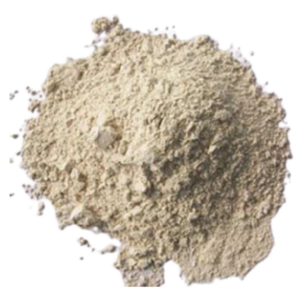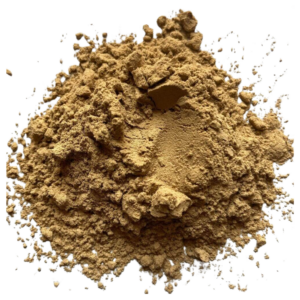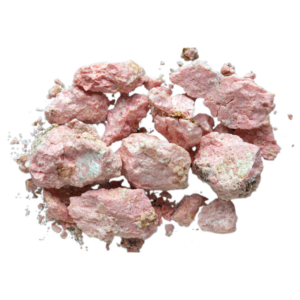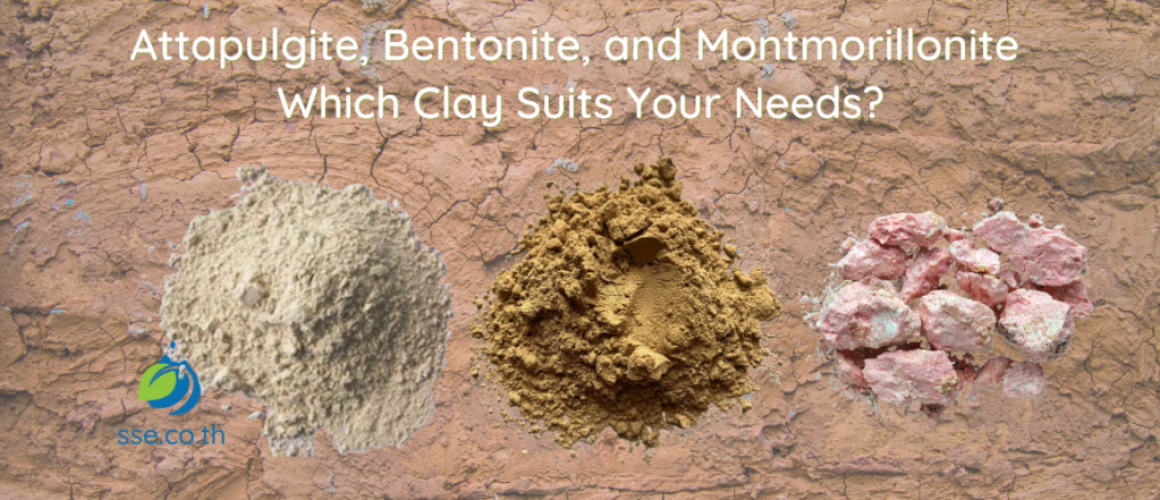Attapulgite, Bentonite, and Montmorillonite: Which Clay Suits Your Needs Best?


| Key Takeaways | Details |
|---|---|
| Attapulgite | Known for its fibrous structure, great for colloidal suspensions and thermal stability. Best suited for pharmaceuticals and absorbents. |
| Bentonite | Composed of montmorillonite, notable for its swelling ability. Ideal for drilling muds, sealants, and absorbents. |
| Montmorillonite | A smectite clay with high cation exchange capacity. Useful for adsorption, soil conditioning, and environmental cleanup. |
Table Of Contents
“Each clay has its unique properties, which make it suitable for specific industrial applications—from attapulgite’s stability to bentonite’s impressive swelling capacity.”
Introduction
If you’ve ever found yourself wondering about the differences between attapulgite, bentonite, and montmorillonite, you’re not alone. These clays are widely used but serve very different purposes. In this blog, we’ll explore what makes each clay unique and help you decide which one suits your specific needs. By comparing attapulgite, bentonite, and montmorillonite, you’ll gain a better understanding of their specific applications and find out which clay is right for you.
1. What Are Attapulgite, Bentonite, and Montmorillonite?
To make an informed choice, it’s essential to understand what attapulgite, bentonite, and montmorillonite actually are. Each of these clays has a unique structure and chemical composition that defines its uses in various industries.
Attapulgite is a hydrated magnesium aluminum silicate with a fibrous structure, making it unique among industrial clay types. This clay is particularly well-suited for use as an adsorbent, in pharmaceuticals, and in suspensions due to its colloidal properties. Bentonite, on the other hand, is primarily composed of montmorillonite, a smectite clay mineral that is known for its ability to swell significantly in water. This property makes bentonite ideal for creating sealing barriers and as a binder in industrial applications. Montmorillonite itself is a type of smectite clay that plays a central role in both bentonite and other industrial clay products, prized for its cation exchange capacity and usefulness in soil treatment and adsorption.
2. Attapulgite: Properties and Uses


Attapulgite is a hydrated magnesium aluminum silicate known for its fibrous structure. This unique structure gives it impressive adsorption capabilities, making it an ideal material for a range of industries. Unlike other clays, attapulgite has excellent colloidal stability, meaning it can form a stable suspension in a liquid medium, which is crucial for applications in paints, pharmaceuticals, and drilling fluids.
| Properties | Details |
|---|---|
| Adsorption Capacity | High adsorption of liquids and gases |
| Thermal Stability | Effective in high-temperature conditions |
| Colloidal Stability | Forms stable suspensions in liquids |
Attapulgite’s properties make it incredibly versatile. It doesn’t swell significantly when in contact with water, which makes it useful in scenarios where stability under wet conditions is needed. It also has notable thermal stability, which allows it to be used in high-temperature processes without degradation. This makes attapulgite valuable for use as a suspending agent in paints and coatings, as well as in the pharmaceutical industry where it serves as an antidiarrheal agent due to its high absorption properties.
3. Bentonite: Properties and Uses


Bentonite, primarily composed of montmorillonite, is best known for its swelling ability, which distinguishes it from other clays. Bentonite’s layered structure allows it to expand when in contact with water, making it highly effective in creating impermeable seals. This swelling property is what makes bentonite the clay of choice for drilling muds, where it helps stabilize boreholes and prevent the ingress of unwanted fluids.
| Types of Bentonite | Characteristics |
|---|---|
| Sodium Bentonite | High swelling, creates tight seals |
| Calcium Bentonite | Less expansive, effective as an absorbent |
Another significant property of bentonite is its plasticity, which means it can be easily molded and shaped when wet. This makes bentonite an excellent binder for foundry sands used in metal casting. Additionally, bentonite is used in sealants for landfills and ponds due to its capacity to create a watertight barrier. There are two main types of bentonite: sodium bentonite, which has high swelling capacity, and calcium bentonite, which is less expansive but still very useful as an adsorbent.
4. Montmorillonite: Properties and Uses


Montmorillonite is a specific type of smectite clay, often found as the primary component of bentonite. Its layered structure, composed of silica and alumina sheets, gives it excellent ion exchange capabilities, making it highly effective for applications such as soil conditioning and environmental cleanup. The ability to exchange cations like calcium and sodium with its environment is crucial for maintaining soil fertility and water retention in agricultural contexts.
| Uses | Details |
|---|---|
| Environmental Cleanup | Adsorbs heavy metals and organic toxins |
| Agricultural Applications | Improves soil fertility through ion exchange |
Montmorillonite is also notable for its high adsorption capabilities, particularly for heavy metals and organic compounds. This makes it a valuable component in environmental applications where toxins need to be removed from water or soil. In cosmetics, montmorillonite is used for its ability to cleanse and detoxify the skin, making it a popular ingredient in face masks and other skincare products.
5. Key Differences Between Attapulgite, Bentonite, and Montmorillonite
Understanding the core differences between these clays can be challenging, but this section will break down the distinctions in terms of chemical composition, physical properties, and common uses. Attapulgite is characterized by its fibrous structure, which makes it suitable for colloidal suspension, whereas bentonite’s main feature is its high swelling capacity, which is useful for sealing and binding. Montmorillonite, often found in bentonite, stands out due to its ion exchange capacity, which is highly beneficial in agriculture and environmental remediation.
| Property | Attapulgite | Bentonite | Montmorillonite |
|---|---|---|---|
| Structure | Fibrous | Layered | Layered |
| Swelling Ability | Low | High (especially Sodium Bentonite) | Moderate |
| Key Feature | Colloidal Stability | Swelling and Sealing | Ion Exchange Capacity |
| Best Use | Pharmaceuticals, Paints | Drilling Mud, Sealants | Soil Conditioning, Adsorption |
The differences between attapulgite, bentonite, and montmorillonite also influence their industrial applications. Attapulgite’s thermal stability and fibrous structure make it ideal for pharmaceutical and industrial absorbent applications. Bentonite’s ability to swell and form a gel-like barrier makes it the preferred choice for drilling fluids and sealing purposes. Montmorillonite’s high cation exchange capacity makes it suitable for adsorption of heavy metals and other environmental uses.
For attapulgite, I think its thermal stability is often overlooked. Many industries underestimate its ability to maintain structural integrity under high temperatures, making it highly valuable in paint formulations and heat-intensive drilling operations. Bentonite’s plasticity is also frequently underrated; it’s not just about swelling, but about its versatility as a binder that makes it indispensable in casting and foundry applications. Montmorillonite’s ion exchange capacity is often seen as a niche feature, but it has profound applications in improving soil health and ensuring more sustainable agricultural practices. Each of these “hidden” features could open doors to more innovative industrial applications if better understood.
6. Choosing the Right Clay for Your Needs
Selecting the right clay depends on your specific requirements. Attapulgite, with its stable fibrous structure, is excellent for uses that require a colloidal suspension or high absorption without significant swelling. It is particularly effective in pharmaceuticals and as a suspending agent in coatings. If your need is to create an impermeable seal, bentonite’s swelling properties make it the ideal choice. Its ability to absorb water and swell allows it to create a barrier, which is perfect for sealing ponds, landfills, and as a drilling fluid additive.
| Requirement | Best Clay |
|---|---|
| High Absorption Without Swelling | Attapulgite |
| Swelling and Sealing | Bentonite |
| Soil Conditioning | Montmorillonite |
Montmorillonite, with its high cation exchange capacity, is ideal for applications that require adsorption and ion exchange. If you’re dealing with environmental cleanup or need a material that can help improve soil fertility, montmorillonite offers the best solution. Each of these clays has unique properties that make it suitable for a variety of industrial applications, and choosing the right one requires understanding both the material’s capabilities and the specific needs of your project.
A common misconception is that all clays can be used interchangeably, particularly bentonite and montmorillonite. Many people think bentonite’s swelling ability makes it suitable for all purposes that involve sealing or adsorption. However, bentonite is ideal for creating physical barriers, while montmorillonite’s strength lies in its ability to retain and exchange cations, which is crucial for nutrient delivery in agriculture and heavy metal adsorption. Understanding these distinctions has helped me guide industries toward more appropriate, cost-effective solutions.
7. Personal Insights: Real-World Applications of Each Clay
I’ve worked extensively with each of these clays in various industries, and I’ll share some practical anecdotes that might help you understand their applications better. For example, I once worked with a company that manufactured cat litter using bentonite. The high swelling properties of sodium bentonite made it incredibly effective for this application, as it could absorb large amounts of moisture, keeping the litter box dry and odor-free.
On another occasion, I consulted with an agricultural company that used montmorillonite to improve soil quality. The clay’s high cation exchange capacity made a significant difference in the soil’s ability to retain nutrients, which ultimately led to improved crop yields. These real-world examples illustrate just how versatile these clays can be, depending on the specific needs of the industry.
I once worked with a water treatment project that relied on montmorillonite’s ion exchange capacity to remove heavy metals from contaminated soil. Initially, the team considered using bentonite, but its primary strength lies in creating barriers rather than adsorbing contaminants effectively. When we switched to montmorillonite, the project saw a dramatic improvement in the removal efficiency of harmful metals, which ultimately led to a successful rehabilitation of the contaminated site. This experience underscored the importance of selecting a clay based on its specific strengths.
8. Frequently Asked Questions
What is the main difference between attapulgite, bentonite, and montmorillonite?
The main difference lies in their structure and properties. Attapulgite has a fibrous structure, bentonite has a layered structure that swells, and montmorillonite is known for its ion exchange capacity.
Which clay is best for drilling fluids?
Bentonite is the best clay for drilling fluids due to its high swelling ability, which helps stabilize boreholes and create impermeable seals.
How does attapulgite work in pharmaceuticals?
Attapulgite is used in pharmaceuticals for its high absorption properties, making it effective as an antidiarrheal agent.
Why is bentonite commonly used in sealants?
Bentonite swells significantly in water, creating a watertight barrier, which makes it ideal for use in sealants for landfills and ponds.
What is montmorillonite’s role in environmental applications?
Montmorillonite is effective for environmental cleanup due to its high adsorption capabilities, particularly for heavy metals and organic toxins.
Can attapulgite be used in high-temperature applications?
Yes, attapulgite has notable thermal stability, making it suitable for high-temperature processes without degradation.
What are the types of bentonite, and how do they differ?
There are two main types of bentonite: sodium bentonite, which has high swelling capacity, and calcium bentonite, which is less expansive but still useful as an adsorbent.
Is montmorillonite the main component of bentonite?
Yes, montmorillonite is the primary component of bentonite, giving it its characteristic swelling and ion exchange properties.
How does the fibrous structure of attapulgite benefit its applications?
The fibrous structure of attapulgite allows it to form stable colloidal suspensions, making it ideal for paints, coatings, and drilling fluids.
Which clay is most suitable for soil conditioning?
Montmorillonite is most suitable for soil conditioning due to its high cation exchange capacity, which helps improve soil fertility.
What makes bentonite a good binder?
Bentonite’s plasticity makes it easy to mold and shape when wet, which is why it is used as a binder in foundry sands for metal casting.
Can attapulgite be used as an adsorbent for gases?
Yes, attapulgite’s high surface area and adsorption capabilities make it effective for adsorbing gases and liquids.
How does montmorillonite’s ion exchange capacity benefit agriculture?
Montmorillonite’s high cation exchange capacity helps retain essential nutrients in the soil, improving fertility and crop yield.
What are the typical applications of attapulgite in industry?
Attapulgite is used in drilling fluids, paints, absorbents, and pharmaceuticals due to its fibrous structure and thermal stability.
How does bentonite create an impermeable seal?
Bentonite swells when it comes into contact with water, expanding to fill gaps and create an impermeable barrier, useful in ponds and landfills.
Is montmorillonite used in cosmetics?
Yes, montmorillonite is used in cosmetics for its detoxifying properties, commonly found in face masks and skincare products.
Why is attapulgite preferred for colloidal suspensions?
Attapulgite’s fibrous structure gives it excellent colloidal stability, making it ideal for creating stable suspensions in paints and coatings.
Which clay is more thermally stable, attapulgite or bentonite?
Attapulgite is more thermally stable than bentonite, making it suitable for high-temperature industrial processes.
How does bentonite’s swelling ability benefit drilling operations?
Bentonite’s swelling ability helps stabilize boreholes by creating a barrier that prevents the flow of unwanted fluids during drilling.
What makes montmorillonite effective for heavy metal adsorption?
Montmorillonite’s high surface area and cation exchange capacity make it highly effective at adsorbing heavy metals from contaminated water or soil.
“I’ve seen firsthand how the swelling ability of sodium bentonite made it the perfect solution for cat litter, keeping homes odor-free and dry.”
9. Conclusion
In the end, each clay has its own strengths. Attapulgite, bentonite, and montmorillonite each offer unique properties that make them suitable for specific industrial uses. Attapulgite is best for applications that require thermal stability and colloidal properties, bentonite is the go-to clay for sealing and adsorption, and montmorillonite shines in ion exchange and soil conditioning. Hopefully, this guide helps you choose the one that meets your needs best.
Call to Action
If you’re looking to explore the right clay for your needs, check out our Activated Clay offerings for more information on effective solutions.
Related Posts and Resources
For a detailed comparison of activated clay types, including a focus on moisture control, check out our Activated Clay vs Bentonite Clay for Moisture Control and Sealing Applications.
To purchase Activated Clay – Desiccant made from clay – Sold in 25kg bags, click here.
For further research, see this external study: Evaluation of Bentonite, attapulgite, and kaolinite as eco-friendly adsorbents.
Disclaimer
This post is intended for informational purposes only. Always consult with an expert to determine the most suitable clay for your specific applications.
ขอบคุณที่ใช้เวลาอ่านบทความของเราเกี่ยวกับการป้องกันความชื้น ทางเราหวังว่าท่านจะได้รับข้อมูลที่มีคุณค่าและเป็นประโยชน์ ทางเรายินดีให้บริการการปรึกษาฟรีเพื่อพูดคุยเกี่ยวกับความต้องการของท่านและให้คำแนะนำเกี่ยวกับวิธีการป้องกันความชื้นที่กำหนดเฉพาะสำหรับคุณ โปรดติดต่อเราที่ 0858124188 เพื่อนัดหมายการปรึกษาหรือเยี่ยมชมร้านค้าของเราเพื่อค้นหาผลิตภัณฑ์ที่ช่วยป้องกันสินค้าของคุณจากความเสียหายจากความชื้น ทางเราหวังว่าจะได้รับข่าวสารจากท่านเร็วๆนี้
